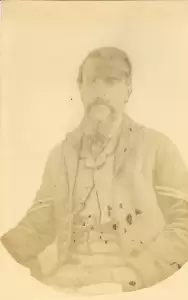Material Change

Oyer III
Hannibal Pierce was keeper of Orange Grove House of Refuge No. 3 near present Delray Beach when another hurricane hit the area in October 1876. Pierce had stopped at the David Brown residence further north on Lake Worth, where his wife, Margretta, and children, Charles and baby Lillie, were visiting. Three Dimick and Geer families were also staying with the Browns temporarily and were storing their belongings on the front porch; after the storm, it was all in the front yard. Belle Dimick Enos later said, “I think the women dried it all out. Everything was too precious. Had to save everything you could.”
Whatever their losses, the new arrivals had learned something, wrote Marion Geer: “We had answered the question: ‘Who is my neighbor?’ It meant to us, all who needed our help … [and] after the lapse of a few years we had representatives of all nations. Ours was in a measure an ideal existence, for selfishness was not one of its elements.”

